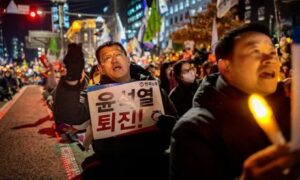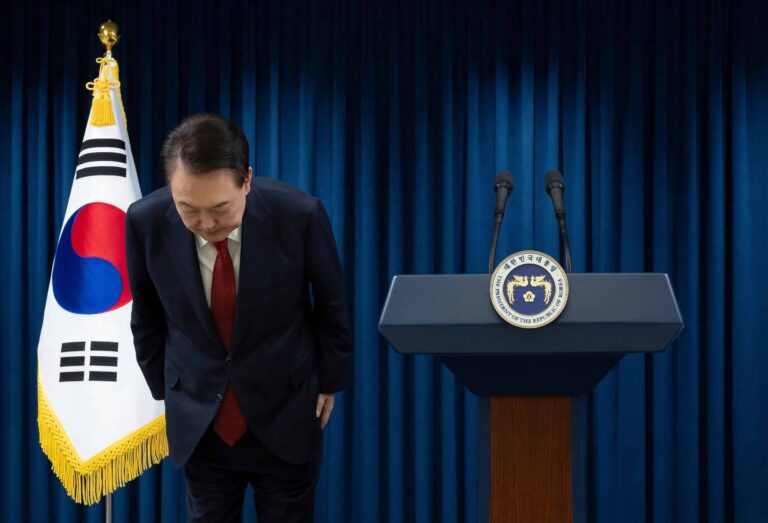South Korea is in the throes of a political storm as President Yoon Suk Yeol faces growing calls for his impeachment following his controversial attempt to impose martial law. In a dramatic televised address, Yoon publicly apologized for the decision, describing it as a desperate act, and vowed to accept any legal or political consequences. However, his contrition has done little to calm the backlash, with opposition lawmakers and even members of his own party pushing for his removal.
The crisis erupted earlier this week when Yoon unexpectedly declared martial law, citing the need to stabilize what he called an “opposition-controlled den of criminals” in parliament. Within hours, lawmakers overwhelmingly voted to overturn the declaration, marking the beginning of a political upheaval that has paralyzed the nation and alarmed its international allies.
In his brief televised apology, Yoon appeared contrite, bowing deeply and expressing remorse to the South Korean people. “I am very sorry and would like to sincerely apologize to the people who were shocked,” he said. “I leave it up to my party to take steps to stabilize the political situation, including the issue of my term in office.”
Yet the apology has done little to quell public outrage. Opposition leader Lee Jae-myung called the gesture “very disappointing” and said it only fueled the public’s sense of betrayal. “The president’s very existence is the biggest risk to South Korea right now,” Lee declared, urging Yoon to resign immediately or face impeachment.
Adding to the president’s woes, Han Dong-hun, the leader of Yoon’s People Power Party (PPP), also called for his resignation. Han accused Yoon of endangering the nation and argued that the president was no longer capable of fulfilling his duties. This division within the ruling party underscores the depth of the crisis, with some PPP members refusing to support impeachment while others voice growing dissatisfaction with Yoon’s leadership.
The impeachment vote, set to take place in the National Assembly, is shaping up to be a pivotal moment for South Korea’s democracy. Opposition parties, which hold 192 seats, need at least eight votes from Yoon’s party to reach the two-thirds majority required for impeachment. Earlier in the week, 18 PPP members joined a unanimous vote to overturn martial law, suggesting that bipartisan support for impeachment is within reach.
The fallout from Yoon’s martial law stunt has left the political landscape in disarray. On Wednesday, heavily armed troops encircled the National Assembly, reportedly under Yoon’s orders to disrupt the legislative process. Lawmakers and key politicians were allegedly targeted for detention under accusations of “anti-state activities.” These actions, described by opposition lawmakers as a “self-coup,” have drawn widespread condemnation and raised concerns about Yoon’s intentions.
Internationally, Yoon’s declaration of martial law has sparked alarm among South Korea’s allies. As one of Asia’s strongest democracies, the political instability threatens to undermine confidence in the nation’s governance. Neighboring Japan and the United States, South Korea’s closest ally, have expressed concern over the unfolding crisis, urging a swift resolution.

Domestically, Yoon’s actions have triggered large-scale protests across the country. On Friday night, labor unions and civic groups organized demonstrations, including a candlelight march near the National Assembly, demanding his resignation. Similar protests have erupted globally, with South Korean communities in cities like London, Paris, and Berlin joining the calls for Yoon to step down.
The president’s troubles are further compounded by scandals involving his wife, Kim Keon Hee. Allegations of stock price manipulation, interference in political nominations, and accepting luxury gifts have made her a significant political liability for Yoon. His repeated vetoes of bills seeking to establish a special counsel to investigate her have fueled accusations of corruption and attempts to shield his family from scrutiny.
As lawmakers prepare for the impeachment vote, the opposition has strategically timed a vote on a fourth attempt to establish a special counsel to investigate Kim, ensuring that ruling party members attend both sessions. This move is seen as a calculated effort to pressure PPP lawmakers into confronting the broader implications of their leader’s actions.
Public opinion appears to be firmly against Yoon. Recent polls show that nearly 74% of South Koreans support impeachment, including a significant portion of conservative voters in traditional PPP strongholds. Critics argue that Yoon’s leadership has been marred by policy missteps, economic struggles, and controversies surrounding his appointments, making his position increasingly untenable.
The fallout from the martial law attempt has exposed deep divisions within South Korea’s political system. Traditionally, voters have remained loyal to ideological camps, but Yoon’s actions have tested those loyalties. Figures like Daegu Mayor Hong Joon-Pyo, a prominent PPP member, have warned that if Yoon is impeached, the party could face irreparable damage. “If Yoon becomes the second president to be impeached after Park Geun-Hye, the party will have no reason to exist,” Hong said.
Meanwhile, allegations continue to emerge about Yoon’s use of martial law as a tool for consolidating power. Reports suggest that during the brief period it was in effect, Yoon ordered the detention of opposition leaders and even members of his own party. National Intelligence Service officials have confirmed that Yoon sought their assistance in targeting lawmakers for detention, further deepening the crisis.
The impeachment vote will not only determine Yoon’s fate but also signal the resilience of South Korea’s democracy. Opposition lawmakers have sought to reassure the international community that the nation remains stable despite the political turmoil. Democratic Party lawmaker Soyoung Lee emphasized South Korea’s strength and resilience, urging foreign investors to maintain confidence in the country’s democratic institutions.
For now, South Korea is at a crossroads, with the impeachment vote representing a defining moment for its political future. As protests grow and public sentiment turns against the president, the nation watches anxiously to see whether its democratic system will prevail against the challenges posed by its embattled leader.
Whether Yoon steps down voluntarily or is forced out by impeachment, the aftermath of this crisis will undoubtedly leave a lasting impact on South Korea’s political landscape. For a nation that has prided itself on democratic progress, the resolution of this turmoil will serve as a critical test of its commitment to upholding the principles of accountability and transparency in governance.

